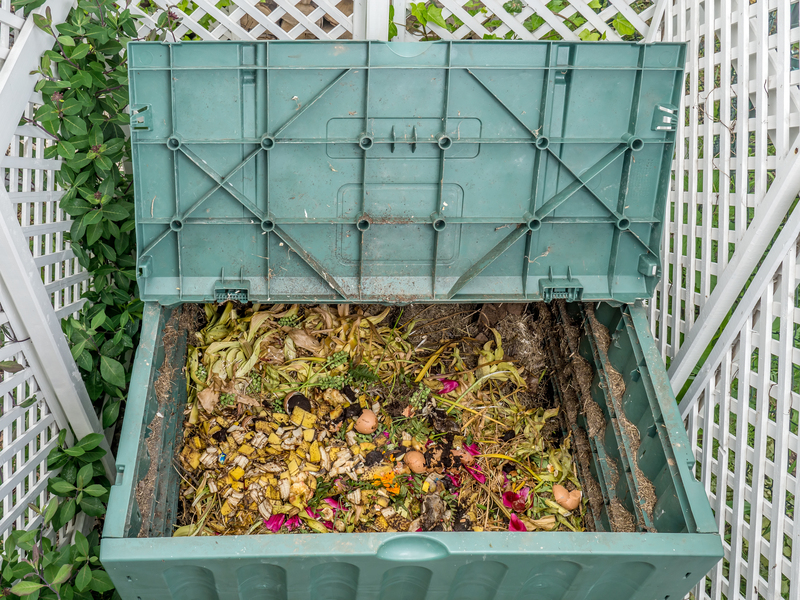Reclaim Your Space with Continued Clutter Control Tips
Are you feeling overwhelmed by the growing piles of items in your home? Are closets bursting, countertops hidden beneath stacks, and drawers impossible to open? Don't worry! With the right strategies, you can reclaim your space and maintain a comfortable, organized environment for good. This extensive guide will walk you through expert methods and effective clutter control tips to foster a lasting, tidy home.

Why Continued Clutter Control is Important
Clutter doesn't just take up space; it impacts your well-being, productivity, and peace of mind. Research shows that messy environments increase stress, decrease focus, and can even harm your health. Organized spaces offer:
- Improved mental clarity and reduced anxiety
- More enjoyable living or working areas
- Greater productivity and creativity
- Less time spent searching for things
- A more stylish and inviting environment
Controlling clutter is not a one-time event but a lifestyle change. Let's explore how to embark on this journey and keep your space clutter-free in the long term.
The Foundations of Ongoing Clutter Management
Decluttering starts with a single step, but the key to reclaiming your space is to turn clutter control into a habit. Here are essential pillars to build upon:
- Commit to Consistency: Short, regular sessions are more effective than occasional marathon efforts.
- Create Simple Systems: Every item should have a "home" to simplify both storage and retrieval.
- Emphasize Maintenance Over Perfection: Don't aim for immaculate; focus on "better than before."
- Stay Mindful of What Enters Your Space: Adopt a habit of regular review and editing of possessions.
Ready to begin? The following clutter control tips will help you take charge--room by room, habit by habit--so you can finally reclaim your space and keep it that way.
Room-by-Room Clutter Control Strategies
1. Entryways and Hallways
First impressions count--for guests and yourself. Entryways should be functional, not dumping grounds. Try these quick wins:
- Install wall hooks or small shelves to contain keys, bags, and hats.
- Utilize baskets or a shoe bench for footwear and smaller items.
- Sort mail immediately; recycle junk mail before it accumulates.
Sustaining order in your entryway sets a positive tone every time you enter or leave.
2. Living Rooms
As one of the most-used rooms, the living room easily becomes cluttered. To maintain a serene space:
- Use multi-purpose furniture (like ottomans with hidden storage).
- Limit decorative items; showcase favorites and rotate them seasonally.
- Designate magazine racks or baskets for remote controls and electronics.
- Set a 5-minute daily "tidy-up" routine for all family members.
3. Kitchens
The kitchen is prone to accumulating gadgets, dishes, and paperwork. Control kitchen clutter by:
- Clearing countertops daily: Only keep essentials like the coffee maker accessible.
- Using drawer dividers for utensils and gadgets.
- Storing infrequently used appliances in harder-to-reach spots.
- Implementing a weekly fridge and pantry check to toss expired items and plan meals.
4. Bedrooms
Clutter in bedrooms disrupts sleep and relaxation. Here's how to reclaim your bedroom:
- Limit what's on nightstands to necessities.
- Use under-bed boxes for off-season clothing or linens.
- Designate a "catch-all" basket for stray socks, books, or chargers--empty it weekly.
- Adopt a "one in, one out" rule for clothes, shoes, and accessories.
5. Bathrooms
Even a tiny bathroom can feel spacious and calm with a few tweaks:
- Hook or bar for each towel.
- Discard old cosmetics and toiletries every few months.
- Use stackable containers or shelves under the sink.
- Keep counters mostly clear except for daily essentials.
6. Home Offices
Your workspace must support focus and productivity. For sustained clutter control:
- Create a filing system for documents--digital when possible.
- Keep only active project materials on your desk.
- Set a visible in-tray for new papers; process it daily.
- Manage cords with cable organizers for a neat look.
Simple Habits for Ongoing Clutter Control
Adopting certain daily and weekly habits is the cornerstone of lasting clutter management:
The "Ten-Minute Tidy"
Set a timer for just ten minutes each day to sweep through main living areas and return items to their designated homes. This prevents pileups and keeps your space spacious and welcoming.
The Donation Box
Keep a box or bag in a convenient spot to collect items you no longer need. When full, take it directly to a local charity. This encourages conscious editing and ensures you're continually lightening your load.
The "One In, One Out" Rule
Whenever you acquire something new (from shirts to books or gadgets), commit to donating or discarding a similar item. This habit ensures your possessions remain manageable and intentional.
Paper Management
- Opt for digital versions: bills, receipts, and magazines.
- Schedule a weekly "paper sweep" to file, shred, or recycle stray documents.
Weekly Reset
Once a week, devote 30-60 minutes to restoring order. This could involve:
- Emptying the catch-all basket in the bedroom
- Sorting out the fridge and pantry
- Re-homing stray items in shared spaces
- Revisiting your donation box
Consistency is key: these small steps, repeated regularly, will keep chaos at bay.
Decluttering Mindsets that Yield Lasting Results
Recognizing that clutter is often rooted in emotional attachments, decision fatigue, or fear of waste can help shift your perspective and reclaim your space with more ease. Consider these positive mindsets:
- You Are Not Your Stuff: Letting go isn't losing identity--it's making room for what's meaningful.
- Progress Over Perfection: Celebrate small victories and accept occasional setbacks.
- Gratitude for Utility: Appreciate items that serve you well; release those that don't.
- Permission to Edit: Your space is a work in progress; regular curation is healthy and necessary.
Adopting these mindsets can make the journey of clutter control feel more rewarding and less like a chore.
Smart Storage and Organization Solutions
Effective clutter control tips often rely on clever storage ideas and organizing tools. Here are some ideas to consider as you look to reclaim your space:
- Vertical Storage: Shelves, hooks, and wall-mounted racks maximize space.
- Clear Containers: Transparent bins make it easy to spot what you own.
- Label Everything: Especially in shared spaces--labels help everyone return items to their proper places.
- Modular Furniture: Pieces that serve multiple purposes reduce the need for excess items.
- Hidden Storage: Benches with lift-tops, beds with drawers, or ottomans with compartments offer stylish, functional options.
Personalize your organizational systems to your daily routines and preferences for the best results.
How to Prevent Clutter From Returning
One of the biggest challenges many face after decluttering is keeping their space organized. Here are ways to ensure your hard work isn't undone:
1. Shop Mindfully
Before making a purchase, ask yourself if the item serves a clear purpose or brings real joy. Avoid impulse buys that quickly turn into clutter.
2. Set Boundaries for Each Space
Every drawer, shelf, and surface should have a purpose. When a space is "full," it's time to review and edit rather than allow overflow.
3. Involve the Whole Household
Get family members or roommates on board. Assign areas of responsibility and communicate expectations for shared areas.
4. Embrace Seasonal Editing
Seasonal transitions are ideal opportunities to re-evaluate clothes, decor, and hobbies--passing along what you no longer use.
5. Revisit Organizational Systems
If systems aren't working, don't be afraid to adjust. Organization is meant to support your life, not add stress.
Clutter Control Tips for Special Challenges
Small Spaces
In small living quarters, effective clutter control is even more crucial. Maximize the functionality and openness with these ideas:
- Opt for foldable or nesting furniture.
- Use behind-the-door racks and hooks.
- Store vertically to save floor space.
- Declutter frequently to prevent build-up.
Keepsakes and Sentimental Items
It's natural to hang onto memories, but choose meaningful ways to cherish them:
- Limit keepsakes to a specific box or trunk.
- Create photo albums or display cherished items as decor.
- Digitize documents or photographs for easy storage and retrieval.
Shared & Family Spaces
With multiple people, communication and compromise are key:
- Define zones for different uses and belongings.
- Hold monthly mini-decluttering sessions as a team.
- Make organization fun: turn tidying up into a timed game for kids.

Popular Tools & Resources for Clutter Control
Take advantage of helpful products and support as you maintain your tidy home. Consider:
- Label makers for defining storage zones
- Storage ottomans for multi-use furniture
- Shelf risers to double your cabinet space
- Donation pick-up services or local charity drop-offs
- Mobile apps for inventory and reminders
Seeking inspiration? Decluttering blogs, YouTube channels, and even professional organizers can provide new ideas tailored to your lifestyle.
Conclusion: Enjoy More Space and Peace with Lasting Clutter Control
Reclaiming your space is not a one-and-done event--it's a rewarding journey that creates a foundation for a quieter mind and a more inviting home. By implementing these continued clutter control tips, establishing simple systems, and repeating positive habits, you'll keep your home organized, tidy, and enjoyable year-round.
Remember: Organization is an ongoing process. Celebrate your progress, adjust as needed, and embrace the comfort and beauty of a clutter-free sanctuary. With a little daily attention and the right mindset, you can control clutter and truly reclaim your space--for good.